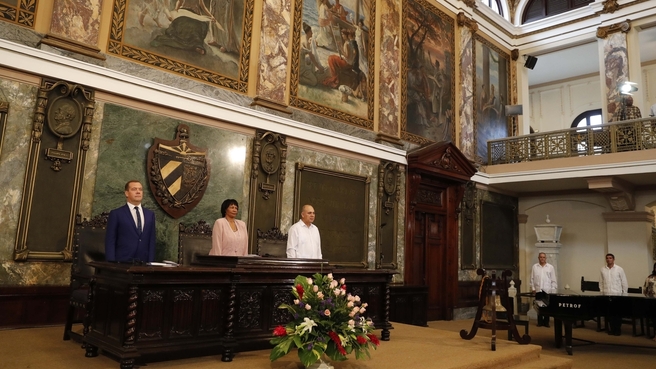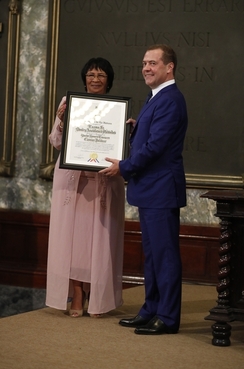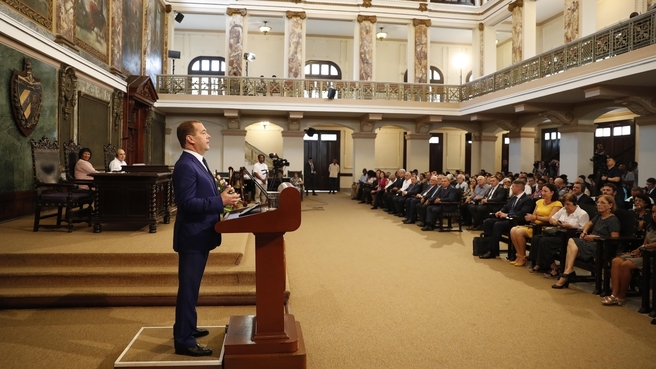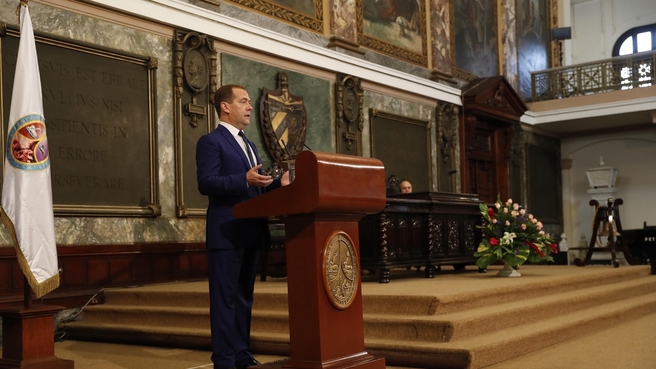Prime Minister Dmitry Medvedev was awarded the title, Honourary Doctor of Political Sciences of the University of Havana
Award ceremony: Dmitry Medvedev receives the title, Honourary Doctor of Political Sciences of the University of Havana
The University of Havana, established by the Dominicans in 1728, is Cuba’s largest and oldest university. At present, about 25,000 students study 32 professions at its 18 faculties. It has 1,273 professors; over half of them have scientific degrees.
The university has 15 scientific centres that conduct research in economics, exact sciences, and the natural, social and humanitarian sciences.
The central library has a wealth of books. It holds over 700,000 rare books that were published in the 15th-18th centuries.
The university maintains broad international ties with education and scientific institutions in more than 30 countries, including Russia.
Dmitry Medvedev’s remarks:
Madam Rector Miriam Nicado Garcia, comrades, ladies and gentlemen, friends,
First of all, I want to thank you for conferring the title of Honourary Doctor of Political Sciences of the University of Havana on me. It’s a great honour and also a great opportunity for the first time and, I hope, not the last, to speak at one of the oldest universities in the Western Hemisphere.
Your university is a unique school, a unique university that has provided training to the leaders of the Cuban revolution, the people who opened the road to freedom and independence for their country. I’m talking about Fidel and Raul Castro and many other prominent Cubans. Their selfless service to the Motherland is an example for the younger generation. As Commandante Fidel Castro said, “What we did yesterday taught us that nothing is impossible. After all, what seemed impossible yesterday was possible today. So, nothing will seem impossible tomorrow. ”
The future of the Republic of Cuba is in your hands, the hands of the youth. You are the ones who will determine the future of the country in an increasingly complex world marked by unpredictability and a variety of challenges.
First of all, I mean (and it is necessary to talk about this) the unwillingness of a number of countries to admit that the modern world has become multipolar. There are related violations of essential international principles enshrined in the UN Charter. This includes respect for sovereignty, non-interference in internal affairs, and intolerance for the use of force or the threat of force. Attempts to replace international law with certain rules established by a small group of selected countries are often, let’s face it, made by just one country, and they are becoming increasingly blatant. After that, they are trying to pass off these decisions as an allegedly existing international order, the position of the entire international community, and to spread it around the world.
A policy of economic pressure on those who disagree is one way to make others follow these “rules.” Simply put, this boils down to illegal unilateral sanctions. Here’s a fun fact. According to analysts, various types of sanctions – individual and sectoral – apply to one third of all countries today, that is, almost 70 states are under sanctions in one way or another. .
Such restrictive measures not only punish governments that pursue an independent policy, make independent decisions, but are primarily a way to interfere in the domestic affairs of certain states. In fact, this limits the rights and freedoms of the citizens of these states. Many Latin American countries, primarily Cuba, Venezuela, Nicaragua and Bolivia, come under this pressure. When someone from outside questions the fundamental principle of Latin American politics – that is, unity in diversity.
As for Cuba, your country has been living under sanctions for nearly 60 years, in fact, under an economic and financial blockade by the United States. Experts estimate that the Cuban economy has suffered a total damage of about one trillion dollars in that time. However, Cuba remains an independent sovereign state and its people cherish freedom above all. As Ernest Hemingway, who understood Cuban mentality better than anyone, said, “But man is not made for defeat. A man can be destroyed but not defeated.”
These words are true not only for Cuba but also for other countries. I would like to say a few words about Venezuela. I think that its internal disagreements – which any country can have, there is nothing unusual about it – can and must be resolved by Venezuelans themselves, through talks and in strict compliance with the national Constitution.
One more thing is quite evident: there can only be one president in Venezuela, elected in accordance with the country’s Constitution, and currently this is Nicolas Maduro.
Your region, in fact, is a testing ground for a new model of all sorts of interference in the affairs of sovereign states, attempts of illegal coups and regime change whereby the United States is acting not only through soft power, as they call it in international relations, but in essence bluntly demanding a change of government. It sticks its nose into all sorts of matters, all sorts of decisions made by other countries. It allocates money to destabilise a political system and at times to interfere directly. And the US will not stand any criticism of its own actions.
Let me share a personal observation. Once I had a meeting with a key member of the US Administration, we spoke about current political issues and life. And in a manner that is characteristic of Americans that person began saying the following: you have such and such problems in Russia, human rights are not observed, another thing, then another … The political system is not quite up to the mark, the TV is not good, something else is wrong. I had to reply – you also have many flaws and problems. For instance, even your president is sometimes elected by the minority of votes because the Constitution makes it possible. What did I hear in response? This is very characteristic, very typical of Americans. I was told – this is our system, it is a stable system that is over 200 years old, don’t you touch it, it has no defects. This is a typical example of double standards.
Russia has always said openly that the use of sanctions in international politics is unacceptable. This includes the latest decisions of the US Administration to toughen restrictions against Cuba. I would like to take this opportunity and once again, while I am here in this university, to confirm our solidarity with the people of Cuba.
Clearly, the sanctions are mainly intended to change Cuba’s political and economic system. But I am certain that the Government of your republic will continue to work successfully and even in these conditions will follow through with the planned reforms while relying on public support and the strength of the young generation, including those who are present in this beautiful hall today.
In Russia, we also started a transformation of our economy and social system. Major shifts have affected almost all areas of our lives. They are extremely important for millions of people living in our country. Their ultimate goal is quite simple as is the ultimate goal of any government, which is to improve the quality of life in our country, the quality of life of our citizens, and raise it to a higher level.
As a matter of course, there are attempts to make achieving this goal more difficult. We, too, are under serious external pressure. Let me remind you that the Soviet Union and Russia have been subjected to sanctions more than a dozen times in the 20th and 21st centuries. Still, that has never forced us to make any changes to our domestic or foreign policy. Now is not an exception. Russia will not succumb to this pressure, and nor will Cuba. We must respond to this pressure with even closer cooperation. It is important to note that the links between Russia and Latin American countries are only getting stronger. Latin America and the Caribbean are among the key regions of international cooperation for Russia. And they are definitely not a ‘backyard’ of the United States. It is in Russia’s interests that Latin American countries and the entire region are stable and prosperous.
Cooperation with Cuba plays a special role for us because our countries have always enjoyed a warm relationship. Today as well, Cuba remains our loyal friend and Russia’s important partner in Latin America. Our bilateral relations are progressing; our mutual trade is growing. We have plenty of ambitious joint projects in energy, metal production, transport infrastructure, vehicle and railway equipment supply as well as in agriculture, science and modern technology, particularly, in pharmaceuticals and biotechnology. Yesterday during the talks with the President of the Council of State and the Council of Ministers, Mr Diaz-Canel, several essential documents were signed by representatives of various government agencies and companies.
Educational, cultural and humanitarian projects are an important part of our relations. The foundation of these projects was built back in the mid-20th century. Thousands of Cubans studied at Soviet and later Russian universities and now, thanks to the skills they obtained, they are actively involved in the life of their country by managing projects and occupying executive posts in public administration. We would like to continue this cooperation in education and are building a necessary regulatory framework for it.
The Russian Government offers Cuban students special conditions for studying at Russian universities. And I would like to take this opportunity to invite anybody who is interested in getting a top-tier education to come to study in Russia.
I also want to invite those who want to learn Russian, a language that has always brought our nations closer. In this context I am particularly pleased to say that Russian studies are being revived in Cuba. After an almost 30-year break, Havana University opened the Pushkin Institute, a Russian language learning and testing centre. This is very important.
Another flagship project is the Cuban branch of the State Russian Museum. At present we are actively engaged in that. The museum will become the first integrated centre for promoting the Russian language and culture in Latin America.
There is also a special internet portal, Education in Russian. Apart from language learning, it offers the opportunity to study other subjects from the Russian general and further education curricula.
Why do people study foreign languages? To meet new friends, get a good job and promote their culture. At the time, the Cuban Revolution gave a boost to studying Spanish in the Soviet Union while more Cubans began to study our language. Today we are witnessing the second wave of interest in Russian, and it is an important sign that we are becoming even closer.
In this context I would also like to welcome the development of partner relations between our countries’ universities.
Last year, Moscow hosted a forum of Russian and Cuban universities’ presidents, which became a milestone event. I am confident that such contacts should be continued.
Of course, various encounters and tourism trends also contribute to bringing our peoples together. In 2018, almost 140,000 Russians visited Cuba, which is one third more than the year before. It means the number of visitors from our country is growing, and this is good. Our people always have an unforgettable experience in Cuba as they travel around your country, where unique nature is combined with unique historical landmarks. They enjoy Cuba’s hospitality, cordiality, and get a charge of sunshine and its energy that the Island of Freedom is so rich in.
On my part, I would like to invite you to our country, to Russia. We also like welcoming guests and really enjoy doing it.
Travelling is important for everyone, but the main journey in the life of every person is the journey to their career, a commitment to realising their plans and dreams.
Those who study today have the whole world before them and nothing seems impossible. What you need is just to believe in yourself, be persistent, and absorb the knowledge you are getting at your university. This university is indeed one of a kind. I am especially pleased that the university in Havana is practically the same age as St Petersburg State University, which is my alma mater.
I would like to sincerely wish you new successes, new projects and new discoveries, of course, because research is impossible without it.
Thank you once again for conferring on me the title of Doctor Honoris Causa of Political Science from the University of Havana.
Muchas gracias!















